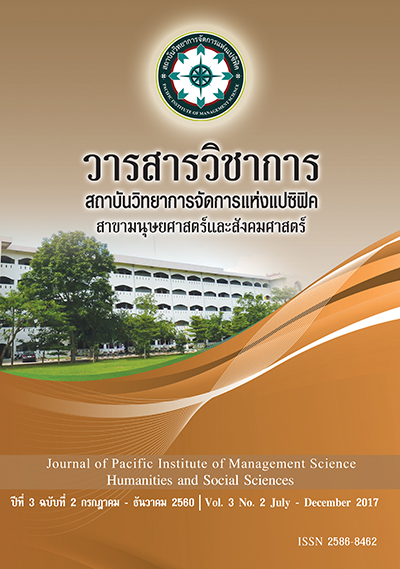School based Management Strategy of Secondary Schools under The Secondary Educational Service Area 23 Office
Keywords:
School based Management Strategy, Secondary SchoolsAbstract
The research entitled, “School based Management Strategy of Secondary Schools under The Secondary Educational Service Area 23 Office Service Area 23 Office,” aimed 1) to study the school based managementstate of secondary schools under The Secondary Educational Service Area 23 Office, 2) to create theschool based management strategy for the secondary schools under The Secondary Educational Service Area 23 Office,and 3) to evaluate the school based management strategy for the secondary schools under The Secondary Educational Service Area 23 Office.
The samples used in the first period of this research were 322 civil servant-teachers, who were teaching in thesecondary schools under The Secondary Educational Service Area 23 Office in the academic year of 2014. While in the second period of this research, the 9 informants were invited to participate in a focus group discussion. And in last period, the 20 experts were invited to be as the informants for evaluation.
The instruments used in this research were the questionnaire, focus group discussion, and the evaluation by the experts. In the quality test, the only items of questionnaire with above .50 value of the IOC were acceptable, and in the reliability test, Cronbach’s alpha value was rated at .98. The statistics used for quantitative data analysis in this research were percentage, mean, and standard deviation. In addition, the content analysis was employed for the qualitative data which were concluded from the experts’ suggestions.
The research findings revealed that
- The level of school based management of the secondary schools under The Secondary Educational Service Area 23 Office overall were at high level. Especially, the decentralization aspect was at the highest level; the self-administrationaspect wasat the lower level, and the lowest level was the participation aspect.
- The school based management strategy for the secondary schools under The Secondary Educational Service Area 23 Office consisted of 2 variables that were relevant to each other, i.e. the 6step-school based management strategy and the 6 school based managment principles.
- The results of evaluation for the school based management strategy for the secondary schools under The Secondary Educational Service Area 23 Officeoverall were at the highest level, while each aspect was found at the highest level as well.
References
นัฐิญาวรรณ ทาลา.(2556). การศึกษาสภาพการบริหารโดยใช้โรงเรียนเป็นฐานของโรงเรียนวัดทิพพาวาส สงักัดสำนักงาน เขตลาดกระบัง กรุงเทพมหานคร. การศึกษาค้นคว้าอิสระ.ครุศาสตรมหาบัณฑิตสาขาการบริหารการศึกษา, มหาวิทยาลัยราชภัฏพระนคร.
รังสรรค์ มณีเล็ก. (2545). การวางแผนกลยุทธ์และการจัดงบประมาณในสถานศึกษา. นนทบุรี : เกรทเอ็ดคูเคชั่น.
สถาบันพัฒนาผู้บริหารการศึกษา. (2548). หลักการจัดการศึกษายุคใหม่. กรุงเทพฯ : โรงพิมพ์คุรุสภาลาดพร้าว.
สำนักงานคณะกรรมการการศึกษาข้ันพื้นฐาน. (2550). แนวทางการกระจายอำนาจการบริหารการจัดการศึกษาให้ คณะกรรมการสำนักงานเขตพื้นที่การศึกษาและสถานศึกษาตามกฎกระทรวงกำหนดหลักเกณฑ์และวิธีการ กระจายอำนาจการบริหารและการจัดการศึกษา พ.ศ. 2550. กรงุเทพมหานคร : โรงพิมพ์ชุมนุมสหกรณ์การเกษตร แห่งประเทศไทย.
สำนักงานเลขาธิการสภาการศึกษา (2551). แผนการศึกษาแห่งชาติ ฉบับปรับปรุง (พ.ศ.2552 –2559). พิมพ์คร้ังที่ 1. กรุงเทพฯ : บริษัท พริกหวานกราฟฟิค จำกัด.
สำนักงานคณะกรรมการพัฒนาการเศรษฐกิจและสังคมแห่งชาติ. (2544). ยุทธศาสตร์การพัฒนาคุณภาพคนและ การคุ้มครองทางสังคมในช่วงแผนพัฒนาเศรษฐกิจและสังคมแห่งชาติฉบับท่ี 9 (พ.ศ. 2545 - 2549). กรุงเทพฯ: โรงพิมพ์คุรุสภาลาดพร้าว.
สำนักงานเลขาธิการสภาการศึกษา. (2551ก). กรอบทิศทางการพัฒนาการศึกษาในช่วงแผนพัฒนาเศรษฐกิจและสังคม แห่งชาติฉบับที่10 (พ.ศ. 2550-2554). กรุงเทพฯ: พริกหวานกราฟิก.
สมศักดิ์ จินดาไทย. (2553). ทักษะการบริหารของผู้บริหารสถานศึกษาที่ส่งผลต่อการบริหารโดยใช้โรงเรียนเป็นฐาน ในสถานศึกษาขั้นพื้นฐานจังหวัดประจวบคีรีขันธ์. วิทยานิพนธ์ครุศาสตรมหาบัณฑิตสาขาการบริหารการศึกษา. มหาวิทยาลัยราชภัฏเพชรบุรี
Downloads
Published
Issue
Section
License
บทความที่ได้รับการตีพิมพ์เป็นลิขสิทธิ์ของ สถาบันวิทยาการจัดการแห่งแปซิฟิค
ข้อความที่ปรากฏในบทความแต่ละเรื่องในวารสารวิชาการเล่มนี้เป็นความคิดเห็นส่วนตัวของผู้เขียนแต่ละท่านไม่เกี่ยวข้องกับสถาบันวิทยาการจัดการแห่งแปซิฟิค และคณาจารย์ท่านอื่นๆในสถาบันฯ แต่อย่างใด ความรับผิดชอบองค์ประกอบทั้งหมดของบทความแต่ละเรื่องเป็นของผู้เขียนแต่ละท่าน หากมีความผิดพลาดใดๆ ผู้เขียนแต่ละท่านจะรับผิดชอบบทความของตนเองแต่ผู้เดียว







